The Man Who Knew Too Little Blu-ray Movie
HomeThe Man Who Knew Too Little Blu-ray Movie 
Warner Bros. | 1997 | 94 min | Rated PG | Aug 05, 2014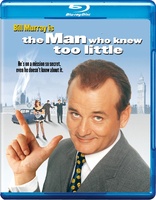
Movie rating
6.6 | / 10 |
Blu-ray rating
| Users | 3.8 | |
| Reviewer | 3.0 | |
| Overall | 3.6 |
Overview
The Man Who Knew Too Little (1997)
While visiting his brother in England, Wallace Ritchie attends the "Theatre Of Life," which promises to treat the participant as a character in a crime drama. When Wallace is mistaken for a real spy, he becomes entangled in a plot to kill Russian dignitaries and reignite the Cold War. But for Wallace, it's all an act.
Starring: Bill Murray, Joanne Whalley, Peter Gallagher, Alfred Molina, Richard Wilson (II)Director: Jon Amiel
| Comedy | Uncertain |
| Thriller | Uncertain |
| Family | Uncertain |
| Crime | Uncertain |
Specifications
Video
Video codec: MPEG-4 AVC
Video resolution: 1080p
Aspect ratio: 1.78:1
Original aspect ratio: 1.85:1
Audio
English: DTS-HD Master Audio 5.1 (48kHz, 24-bit)
German: Dolby Digital 5.1 (640 kbps)
Spanish: Dolby Digital 2.0
Portuguese: Dolby Digital 2.0
Japanese: Dolby Digital 2.0
Japanese is hidden
Subtitles
English SDH, French, Spanish, Portuguese, Japanese, German SDH
Discs
25GB Blu-ray Disc
Single disc (1 BD)
Playback
Region free
Review
Rating summary
| Movie | 2.5 | |
| Video | 4.5 | |
| Audio | 4.0 | |
| Extras | 2.0 | |
| Overall | 3.0 |
The Man Who Knew Too Little Blu-ray Movie Review
Murray Lite
Reviewed by Michael Reuben August 4, 2014Director Jon Amiel claims that the role of clueless American tourist Wallace Ritchie in The Man Who Knew Too Little was a departure for the great Bill Murray, but any fan of What About Bob? should recognize Wallace's comic progenitor in Murray's earlier portrayal of the hopelessly neurotic Bob Wiley. Both characters are self-absorbed, blunder through the world helplessly and yet always manage to come out on top, while they leave seemingly more capable individuals gasping in their wake. And both exert an unlikely power over the opposite sex. Murray is equally brilliant in both roles, but What About Bob? was a box office success and remains a favorite among fans (despite being criminally mistreated on video by Disney), while The Man Who Knew Too Little (hereafter, "TMWKTL") has always seemed a lesser effort. On this viewing, I think I finally understand why. More on that below. TMWKTL was adapted from an unpublished novel called Watch That Man by former singer/songwriter Robert Farrar. Farrar, who is British, co-wrote the adaptation with American screenwriter Howard Franklin, who had scripted and co-directed one of Murray's best films, Quick Change. Director Amiel, who first made his name with the original TV production of The Singing Detective, directed TMWKTL as a palate cleanser between two Nineties thrillers, Copycat (1995) and Entrapment (1999).
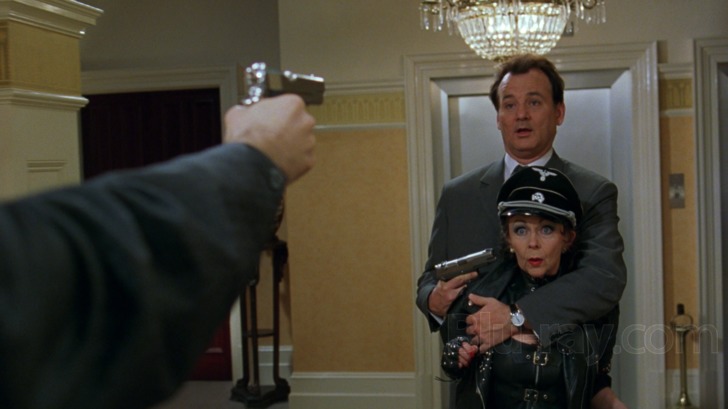
Wallace Ritchie (Murray) is a video store clerk from Des Moines who surprises his London-based brother, James (Peter Gallagher), by visiting London as Wallace's birthday present to himself. When Wallace appears on James's doorstep, James is delighted to see his brother, but the timing couldn't be worse. An aspiring investment banker, James has a major business function that evening. His stuffy boss (Donald Pickering) and a wealthy German prospect (Terence Harvey) are coming for dinner with their wives, and James's wife, Barbara (Anna Chancellor), has gone all out to prepare a sophisticated occasion—or rather she's aggressively supervised the hapless maid, Consuela (Isabel Hernández). To keep Wallace occupied for the night, James hits upon the latest craze in London's avant-garde theater community, the Theatre of Life, a nightly "play" in which the spectators are assigned roles and the stage is all of London. (It sounds more like a fraternity prank than a theatrical event, but never mind.) By sheer happenstance, however, the phone booth to which the Theatre of Life directs Wallace for his first "cue" is also the communications drop for a covert operation masterminded by the heads of British and Soviet intelligence, Sir Roger Daggenhurst (Richard Wilson) and "Sergei" (Nicholas Woodeson), who want to restart the Cold War so that their funding is restored. From the moment Wallace answers the phone, everything that happens to him is real, but he thinks it's all an act. Some of Bill Murray's earliest sketch characters on Saturday Night Live were second-rate performers such as lounge lizards and talk show hosts, and in TMWKTL he redirects that talent into Wallace's efforts to play a hard-boiled tough guy who is constantly breaking character to comment on his own portrayal and that of his fellow "actors". They, in turn, conclude that this "Spenser"—the British agent (Terry O'Neill) for whom Wallace has been mistaken and who is very unhappy about it—must be some sort of super-spy. How else could he suddenly appear in the middle of their operation and seem to know so much? (Of course, they read deep significance into his most innocent of remarks.) Murray and his director took great pains to work out physical business that would allow a klutz like Wallace to miraculously get the better of trained operatives. These include the former Soviet Union's most notorious killer, Boris "The Butcher" Blavasky (Alfred Molina), who would much prefer to retire to civilian life as, you guessed it, a real butcher. Still, there are some close calls. "Time out!" yells Wallace as he's standing on a ledge high above the street being shot at. "I got something in my eye, jagoff!" Wallace's favorite member of what he believes to be his Theatre of Life "cast" is Lorelei a/k/a "Lori" (Joanna Whalley), the British undercover agent who seduced the Minister of Defence (John Standing) so that he could be blackmailed into aiding the conspiracy. She thinks Wallace has been sent to kill her, which is, in fact, the real Spenser's mission. When Wallace lets her live, Lori thinks he's fallen for her. Wallace assumes it's all an act on Lori's part, but he would like to call her after the show. (Who wouldn't?) The spy plot and Wallace's masquerade reach their farcical conclusion at a major diplomatic function where a Russian doll containing a bomb plays a prominent role and Wallace gets to join a troupe of Russian folk dancers. He saves the day and doesn't even know it. The sequence has the complexity and precision timing of classic farce, and everyone in it is flawless, but it never builds to the comic finale that the picture deserves. Indeed, for its entire running time, TMWKTL always seems on the verge of taking off, and then always throttles back into idle mode. I recently rewatched What About Bob?, and it suddenly hit me (between the laughs) why that film works so well; it's Richard Dreyfus's Dr. Leo Marvin, who slowly goes crazy as Murray's Bob Wiley recovers. Murray's comic characters need a proper antagonist, someone who opposes them at every turn, is never won over by them and ultimately goes down in flaming defeat while Murray soars above on angel's wings. It doesn't matter whether Murray's character is clever and disdainful, like Peter Venkman in Ghostbusters (who was systematically opposed by "dickless" EPA investigator Walter Peck), or an idiot savant like Bob. There must an implacable enemy who keeps insisting, as Dr. Marvin does in Bob, that everyone else has been duped (which, in TMWKTL, they actually have). But Wallace Ritchie wins everyone over. His brother embraces him, Lori falls for him, the intelligence community celebrates him (although they're still not quite sure who he is) and at the end . . . well, I'll skip the specifics, but let's just say that no one discovers their mistake (and Amiel confirms in the commentary that he deliberately chose to end the film that way). So much of Murray's deadpan brilliance occurs in reaction to people who have been driven to distraction by his unflappable certainty that his own misbehavior is justified. Maybe it was a mistake to set him loose among the British. Most of them are just too polite to serve as a proper foil to a classic Bill Murray character. Even the mugger who takes his wallet (Eddie Marsan, in his first film) is unnerved by Wallace Ritchie's failure to respect the established protocol for being a victim. What Murray really needed to bring out the best in his performance was to encounter someone equally self-absorbed—John Cleese's Basil Fawlty, for example. Now he would have been a proper British adversary.
The Man Who Knew Too Little Blu-ray Movie, Video Quality 
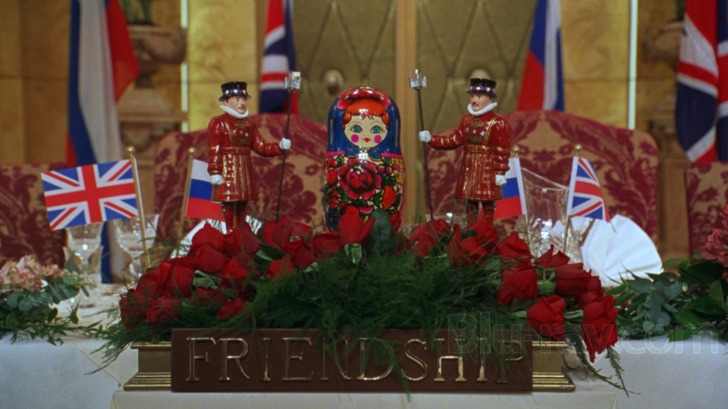
The Man Who Knew Too Little was shot by Robert M. Stevens, a veteran camera operator who graduated to cinematographer on such comedy classics as The Naked Gun movies and John Waters' Serial Mom. Except for the opening sequence, when Wallace Ritchie enters the U.K., and a final sequence that serves as a kind of epilogue, the entire film takes place at night, much of it outdoors, and the production shot in real locations. Much of the film's humor depends on outlandish behavior in situations that are, in and of themselves, relatively ordinary (at least until we get to the Russian dancers at the diplomatic banquet). Warner's 1080p, AVC-encoded Blu-ray is one of the best catalog efforts I've seen from the studio in a while. The image is impressively clear, sharp and detailed but without the video appearance that results from electronic manipulation. It has a film-like appearance with texture and a finely rendered grain pattern. The blacks in the night scenes are finely delineated in varying shades that provide a sense of depth, and the color palette runs from the institutional drabness of the immigration checkpoint in the opening scene to the brightly saturated hues of the dancers' costumes—and, of course, that ticking Russian doll—in the film's grand finale. Bill Murray's face wasn't yet as craggy as it has become in his later years, but the beginnings are already evident, and the Blu-ray reproduces every incipient wrinkle that the camera picked up. Warner continues to favor low bitrates, but the disc's average of 22.97 Mbps isn't bad for this film, which is more talk than action. The image certainly didn't suffer from any artifacts.
The Man Who Knew Too Little Blu-ray Movie, Audio Quality 
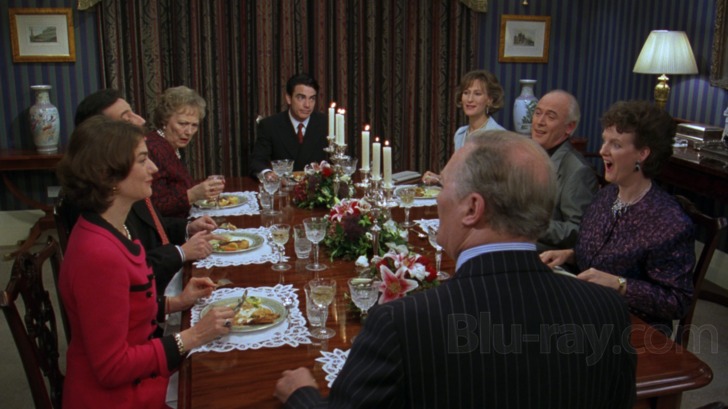
The film's original 5.1 sound mix has been encoded in lossless DTS-HD MA, and it has some clever touches. In an effort to make the comedy dark but funny, Amiel kept in one onscreen (sort of) death and a fair number of gunshots, but the gunfire has a cartoonish sound, often traveling from one side to the other with an exaggerated ricochet or echo. There's one well-timed explosion and an elaborate car chase involving a mini-cooper, but both of these have sound effects more suitable to Wile E. Coyote than Jason Bourne. The ambiance of London's outdoors is placed subtly in the surrounds, but generally this is a front-oriented mix. The dialogue is always clear (unless you have trouble with British accents), and the score by Christopher Young (Deliver Us From Evil) is a delight, because much of it is made up of variations on the familiar standard, "Fever", which sounds tough, cool and hard-boiled, i.e., everything that Wallace Ritchie isn't.
The Man Who Knew Too Little Blu-ray Movie, Special Features and Extras 
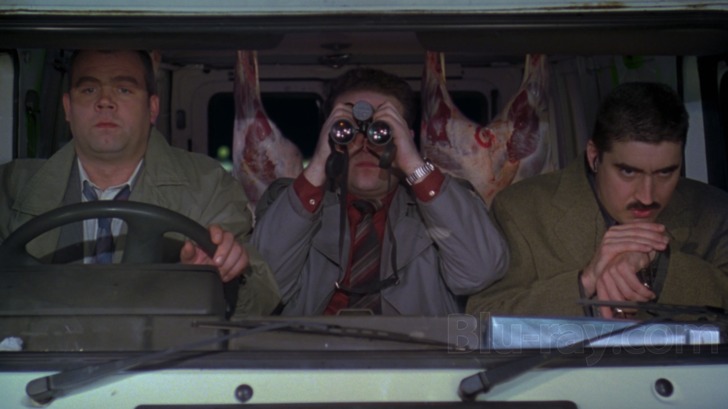
The extras have been ported over from Warner's 1998 DVD of TMWKTL, but not all the extras have made the trip. Omitted is the separate 5.1 music-only track, as well as three TV spots and several bonus trailers.
- Commentary with John Amiel: Because Amiel recorded this commentary shortly after the film's release, his memory is fresh and he relates numerous details about the experience of filming, including script revisions and Murray's improvs, many of which are in the film. (And where oh where are the deleted scenes? According to Amiel, there are numerous alternate versions of Wallace's speech to the British immigration clerk, all improvised by Murray on the spot.) Amiel is especially entertaining when pointing out moments that are uniquely British, such as the decor of James Ritchie's living room and what it says about his wife's social aspirations.
- Theatrical Trailer (480i; 1.78:1, enhanced; 1:47): "This fall, the intelligence community gets a little less intelligent."
The Man Who Knew Too Little Blu-ray Movie, Overall Score and Recommendation 
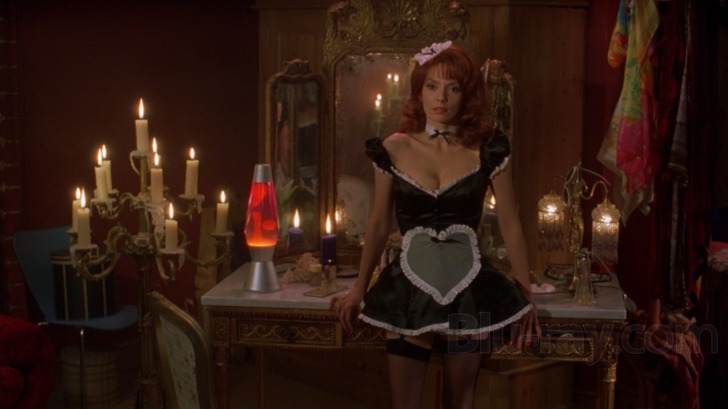
Two of the best things in TMWKTL aren't in the feature itself. The opening animation is an inspired mash-up of spy drama and the Pink Panther, as the lettering enacts a cartoon spy caper over scenes of the Russian doll being loaded with a bomb; Amiel says the sequence cost so much that he didn't want to provide the figure to the studio. The closing credits recycle Nancy Sinatra's song "The Last of the Secret Agents" from the 1966 film of the same name and written by Lee Hazlewood in the same rhythm as Ms. Sinatra's signature hit, "These Boots Are Made for Walking". For some reason, the lyrics seems funnier here: "He's never caught one spy untold; he's never even caught a cold." As for the rest of the film, even lesser Bill Murray is a cut above most other comedy, and Warner has done a nice job with the audio and video. At this price, recommended, but keep your DVD for the missing features.
Similar titles
Similar titles you might also like

Blank Check
1994

Big Trouble
2002

Ernest Goes to Jail
1990

Guns, Girls and Gambling
2012

Garfield: A Tail of Two Kitties
2006

Spies Like Us
1985

Moonwalkers
2015

Burnt
2015

Bad Company
2002

My Cousin Vinny
1992

The Naked Gun: From the Files of Police Squad! 4K
1988

Modern Family: The Complete Fifth Season
2013-2014

Safe Men
1998

Keanu
2016

Amos & Andrew
1993

Paul Blart: Mall Cop 2
2015

Blame It on the Bellboy
1992

Undercover Blues
1993

Saving Grace
Warner Archive Collection
2000

The Three Stooges
2012
